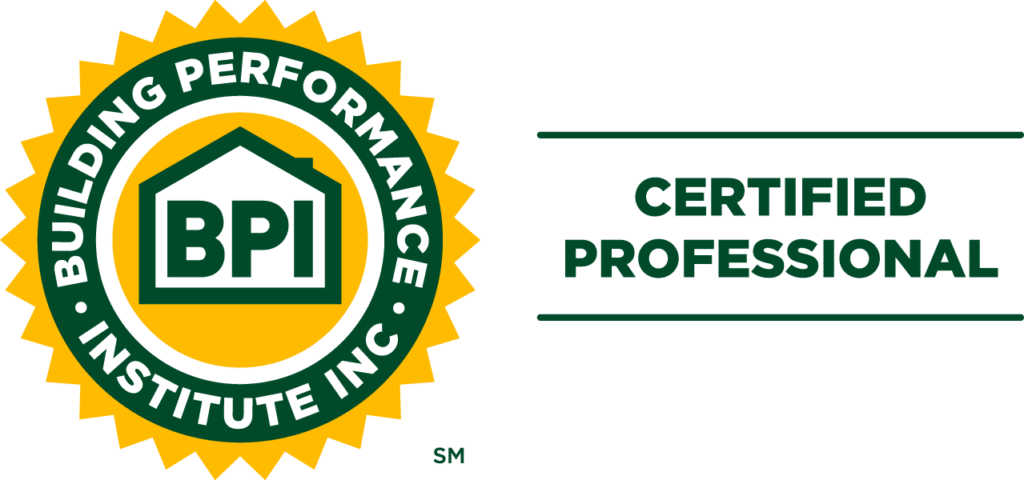Chilly months have arrived here in Waynesboro and Charlottesville, and after not having any snow to speak of last winter, our children are polishing up their sleds and greatly anticipating the predicted snowfall for this season. Winter festivities are fun, but are so much more enjoyable when you have a well-insulated, warm home that is protected from the elements.
At Responsible House we’re building scientists, which means we understand the importance of insulation and air sealing to maximize your home comfort and efficiency. These fundamental home upgrades can help you stay cozy any time of the year—here’s how.
Types of Heat Flow
To understand how insulation works, it’s important to first know how heat moves through your home. Heat will always move from warmer to cooler areas, and during the winter the heat in your home will gravitate from your living spaces to an unconditioned attic, garage, or crawl space. When it’s cold outside, heat will also escape from gaps, cracks, and other areas where air leaks are present. Insulation provides an added layer of protection that can help prevent unwanted heat transfer through your home.
Heat can move in three ways: conduction, convection, and radiation.
- Conduction – This is when heat moves from one solid object to another via direct touch. In a home, conduction can be seen where the temperature difference is the greatest, like windows, roof, and exterior walls.
- Convection – This is when heat flows through liquid, gasses, and air. Convection explains how warm air rises and is replaced with cooler air in a home.
- Radiation – When heat is transferred through electromagnetic waves. Unlike conduction and convection, radiation does not require a medium for heat transfer. The most widely known source of radiation heat flow is heat from the sun’s rays.
Insulation & Winter Home Comfort
Insulation acts as a down jacket for your home, keeping heated air in your living spaces throughout the winter. However, it’s a common misconception that insulation only keeps your home warm in the winter—it can help keep cool, conditioned air inside throughout the warmer months too. By slowing heat flow, insulation plays a crucial role in your home’s energy efficiency and comfort. Even with the most advanced HVAC system on the market, a home with significant air leaks and poor insulation will still suffer from high energy bills, indoor drafts, and uneven temperatures.
Why Air Sealing Matters
Air leaks are one of the top contributors to energy loss in a home, with ENERGY STAR reporting that gaps and cracks in your building envelope can add up to the equivalent of leaving a window open all year long. While most types of insulation technically protect your home from conductive and convective heat transfer, excessive air flow can actually degrade cellulose and fiberglass insulation. This is not the case, however, with spray foam insulation, as it has both air sealing and insulative qualities. Air sealing prevents this unwanted airflow in and out of your home, which enhances the benefits of insulation while also helping keep your home protected from moisture intrusion.
How to Measure Insulation’s Effectiveness
Most types of insulation protect your home from conductive heat transfer, and an insulative material’s thermal resistance—or its ability to resist conduction—is measured by a rating known as R-value. Higher R-values translate to a higher thermal resistance, and the Department of Energy recommends specific R-values for different climate zones. Charlottesville and Waynesboro are in climate zone 4 with the following recommended insulation R-values throughout a home:
- Uninsulated attics – R60
- Uninsulated floors – R19
- Uninsulated exterior walls – R20 within framing + R5 of continuous insulation between framing and siding
Maximize Your Benefits With Spray Foam Insulation
At Responsible House, we install high-quality spray foam insulation, which has a high R-value and air seals in addition to protecting your home from all 3 types of heat transfer (most types of insulation only slow conductive and convective heat flow). Spray foam also offers several other whole-home benefits, including:
- Improved indoor air quality
- Noise reduction
- Lower heating & cooling costs
- Moisture control
- Long-lasting
- Radiant barrier
Spray foam insulation is a great solution for any area of your home, but can be especially beneficial for hard to reach places that are prone to energy loss, like attics, crawl spaces, and exterior walls.
Take the Guesswork Out of Home Upgrades With Responsible House
We’ve been helping homeowners throughout Central Virginia make their homes more comfortable and energy efficient since 1995. With an extensive background in home construction and building science, we are equipped to find the most reliable and effective insulation solutions for the unique homes in our service area. Whether you have a historic home or something more modern, we have the necessary knowledge to keep you comfortable this winter and for many more to come. We even stay up to date with what incentives and rebates are available in Charlottesville and Waynesboro to help you maximize your savings and efficiency.




